On the surface, Run Sweetheart Run is a cat-and-mouse horror film about a young woman, Cherie (Ella Balinska), running for her life. Seriously, Balinska runs a lot. The actress became so engrossed in sprinting that writer/director Shana Feste asked Balinska to slow down during takes because the camera department could not keep up. The amount of running will catch your eye, but the film’s portrayal of an intelligent woman fighting back against the patriarchy will grab your attention.
Cherie is a single mother in law school who works at a law firm to make ends meet. Cherie agrees to go on a date with her boss’s client, Ethan (Pilou Asbæk), a charming businessman. After a lovely night, Cherie agrees to one final drink at the client’s home, but the date suddenly becomes a nightmare after Ethan violently attacks her. This leads Cherie on a fast-paced adventure throughout one night in Los Angeles as the bloodthirsty Ethan methodically hunts her at every turn. Based on events in Feste’s life, the film becomes a champion for female empowerment and depicts a woman’s battle with the misogynistic forces trying to tear her down.
In an interview with Digital Trends, Balinska and Feste discuss the importance of a Black female protagonist, the harrowing relationship between Cherie and Ethan, and the balance between social commentary and horror.
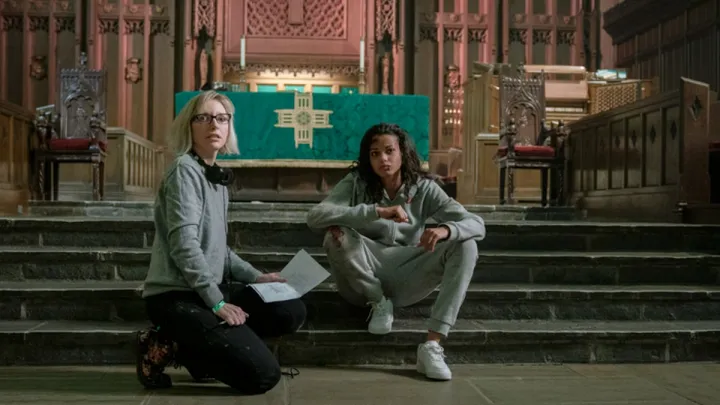
Note: This interview has been edited for length and clarity.
The film premiered at Sundance almost three years ago. It was supposed to come out in the spring of 2020. The pandemic began, and it was pulled from its release date. Now it’s finally going to be seen by audiences everywhere. Can you describe your emotions knowing that this three-year journey is coming to fruition?
Ella Balinska: I could speak for ages on this, but I think the word is “finally.” It’s really great for it to be coming out. The themes in this film that was so relevant back in 2019 are still relevant now. I also would love to add that it is so nice to be able to finally shake the last of this character. [Laughs] It’s a nice bit of closure.
Shana Feste: It’s a mix of like “finally,” and how tired I am. I told Ella the other day, “I think this is the longest relationship I’ve ever had with an actor in my mind.” Like, we’re still in it. We were shooting this last year. We were doing a reshoot last year that we never expected to do. But, I’m just incredibly grateful that it’s finally going to see the light of day because that was the worst for any filmmaker releasing a movie at the height of the pandemic. We were all just so lost and scared and wondering if our work would ever be seen. For Amazon to be supporting and putting it out like this, I’m very grateful.
Shana, you’ve talked about how personal this film is for you. It was inspired by events that happened in your life. As a filmmaker, how did you channel those feelings into the film? How do you balance what to include and exclude about your experience?
Feste: I think for me, I don’t know how to direct anything that isn’t personal to me. It has to come from a really personal place. The reason there’s so much period blood in it, I was trying to confront my own shame of having my period when I was 13 years old. That’s something that I was really scared to shoot. I like feeling challenged by my own material, and I knew I needed to do it. I knew it was the right thing to do.
Even as a survivor, it definitely impacted the way that I shot the film. I didn’t shoot a rape scene in this film. I did the opposite. I stayed outside the door the whole time, which made it even more challenging as a filmmaker to rely on your collaborators. I was relying on our sound design and our locations department to find the perfect location. Our cinematography, the music, the score by Rob, everything was helping me tell that story and making it just as terrifying as if you were able to actually watch it.
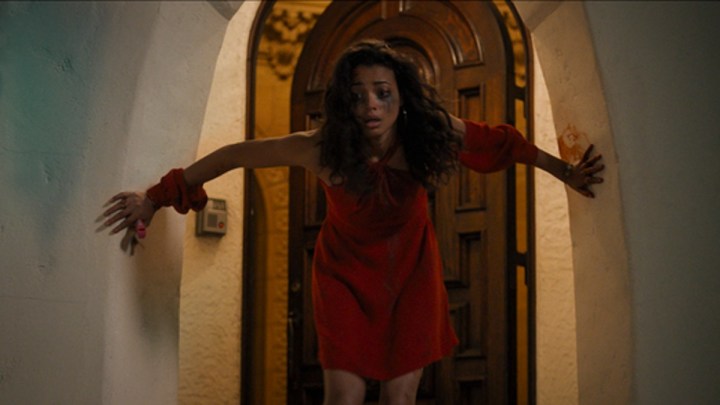
The use of blood was interesting, especially regarding Cherie’s period. Ella, why was it important to normalize periods in this film?
Balinska: This is a really awesome portrayal of it [Cherie’s period] being used to empower the character. It gets used as a mechanism to save her life. In the overpass scene, she throws her tampon to literally save her life at that moment. And it’s so smart. I don’t even know if I would think about that. I would think it’s so taboo.
That was the other thing. Being on set and addressing those scenes, I’m like, “50% of us on this planet go through this.” That was a journey for me, too, getting comfortable. I hope that people can watch this film and start their journey feeling more comfortable, too.
What stood out about Ella during this process?
Feste: I think she’s just a force. So much of what I did, by not showing Ethan’s true form, I chose to play it all in her face. At the end of the film, it’s all played in these tight, close-ups. I knew I needed an actress that could basically be in a rom-com in the first act and a thriller in the second and a horror film in the third. That could play all those various colors. Ella impressed me so much with what she was able to do, and it was an incredibly physical role as well. Not only is Ella an action star, but she’s a dramatic actress so she was able to bring everything to the table.
Ella, what was your reaction when reading the script for the first time?
Balinska: I really was blown away by the arc that she went on. This film isn’t structured like a normal horror film where something scary happens, and then there’s the ghost. And then we all wake up the next day and talk about the ghost. Then, it happens again. Once you start this movie, you’re in and you run and the film doesn’t stop until the situation stops. It’s really sequential in one night. The sheer amount of growth that she goes through this one night is something that, as an actor, I really was open to taking on that challenge. It isn’t something that you see too often.
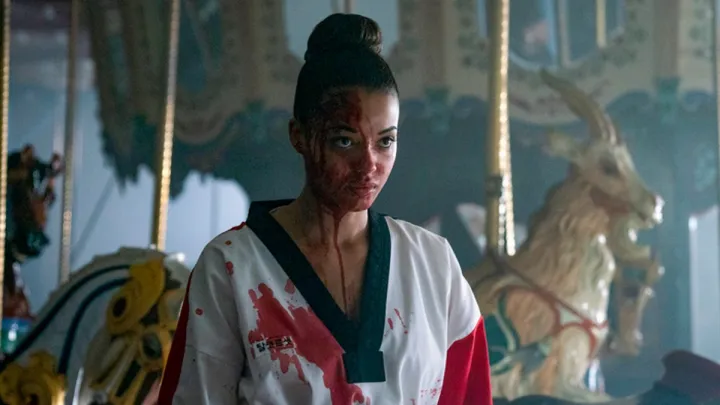
Did you expect to be running this much in the film? It felt like you ran the equivalent of a marathon.
Balinska: Yes. It’s funny, they did warn me that I was definitely going to be needing to put one foot in front of the other a few times here. [Laughs] I think one of the best aspects of the film is the pace it brings to the movie.
Feste: Sometimes, she was almost too scared. Sometimes when she was running, the camera department couldn’t even keep up with her because she was so in that moment of being terrorized, and she was truly running for her life. I’m like, “OK, Ella. You got to slow down for these guys.” [Laughs] It was so real, and she had conveyed it so powerfully that it was almost too fast to film.
Shana, what came first? Did you have an idea for a horror film, and then you decided to incorporate social commentary and themes about misogyny and feminism? Or vice versa?
Feste: Yeah. It stemmed from my frustration and anger. And having a daughter and living and growing up in Los Angeles and thinking, “I don’t want her to experience Los Angeles in the same way that I did.” I think I’m finally able to write about what happened to me. Los Angeles is definitely a character in the movie because it’s obviously a beautiful city that we all love. It’s glamorous, but it has a really dark underbelly. It has a really vicious side to it, and so I wanted to show that side and let it in as a character in my movie.
I liked how you set it at night. It gives off this gritty, tenacious feeling. I thought of Michael Mann’s Collateral, Nightcrawler, or Drive.
Feste: One thing I will never do again is set an entire movie at night. Ever.
It has to be difficult.
Feste: It was so intense and much worse for my actors than for me. [Laughs]
Cherie is a Black female protagonist. She’s a single mother who is highly intelligent. She’s not your typical damsel in distress. She’s tough, and she’s a survivor. Why was it important to showcase this type of protagonist that maybe we don’t see too often?
Balinska: It’s an empowering portrayal of a woman put through these extraordinary situations and circumstances. I think audiences would be able to see a lot of themselves in a lot of what she goes through. The important thing for me, Shana, and Effie was to maintain the authenticity of each moment that Cherie was going through.
It’s so easy to fall into the screen queen element of it all, but it wasn’t right for this film. [We] Made sure that we balanced the horror and the thrill of the genre, but also with the authenticity of what this film is trying to say.
Feste: Well, I really did want her to be smart. I wanted her to figure her way out of this situation constantly because I hate those horror movies where you’re watching and you’re like, “Don’t go in there! Don’t go in there!” I don’t think Cherie ever has that moment where you’re like, “Don’t do it. Please. Come on. He’s behind the door.” Whatever it is.
I really wanted to create a Black final girl. That’s something that we don’t often see. We don’t often see women win in film, in general, and we certainly don’t often see Black women be the last survivor in a film. I think with the help of Effie Brown, we got to go back into the film, and we got to open a writers’ room with Black writers who were incredibly talented, Kellee Terrell and Keith Adkins. We got to bring so much more authenticity to her character and really amplify the film with their collaboration.
Pilou is captivating and magnetic onscreen. Ella, what was your experience like working alongside him?
Balinska: He is the eternal gentleman. He’s so charming. He’s wonderful. He always asked permission for all of the craziness that he went and did. The thing I will say is that once you’re in a scene with him, he doesn’t say when he’s going to do it. [Laughs] He is terrifying, but I think that is perfect. Shana greenlit him on that because it meant that from moment to moment, the audience and Cherie feel that fear.
Pilou is known for playing villains. Shana, why did you believe Pilou could handle the romantic aspect of the character as well as the monstrous side?
Feste: In his body of work in Denmark, you see that he’s like a master class in acting. He’s done it all. And I was so charmed by Pilou personally because he’s such a sweet, affable, lovely guy that you just want to laugh with that. I knew there was this whole other side, and we talked a lot about like romantic comedies. We talked a lot about Hugh Grant and the physicality of a romantic star.
Because he [Pilou] is a physically imposing person and he has that intensity, how could we dim that? Was it that he had to always be looking up at Cherie? Does his posture change? His physicality had to be less threatening. He was like, “Yeah, let’s do it. Let’s have some fun.”
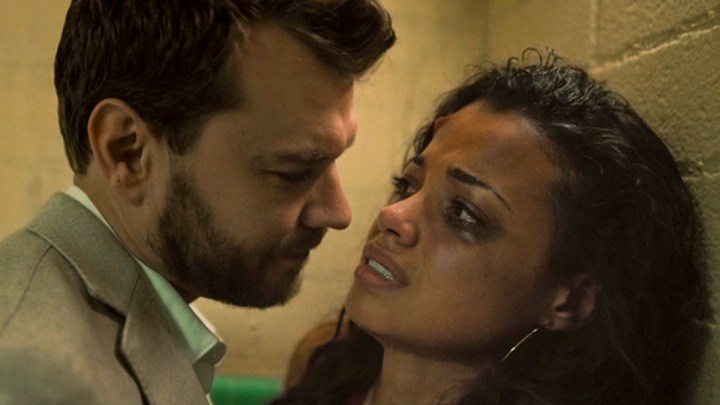
You also decided to not show Ethan’s initial attack against Cherie. Why did you have Pilou’s character stop the camera and break the fourth wall?
Feste: Well, I was thinking a lot about what is the most terrifying villain. How could we convey to the audience exactly how powerful he is? Well, he should control the camera, too. He’s controlling the narrative. He should absolutely control the camera. The people that are the most frightening to me are those men who present as one thing in public, but behind closed doors are something truly different and evil.
And so Pilou stops the camera from seeing his true self. I think that’s incredibly relatable in the MeToo movement. That you can be out there publicly as someone incredibly loveable, but behind closed doors, you’re a different person altogether. Gradually, that’s being exposed and has definitely been exposed in this film.
The film is directed and co-written by a woman along with female producers and female crewmembers. Because of the female representation, did you feel a sense of importance while telling this story?
Balinska: Yes. Absolutely, especially with a lot of the themes that arise in the film. [Having] That support and being surrounded by other women, too, there were moments on set which were very triggering for a lot of people because you never know what other people have experienced. Because Shana built an atmosphere of such trust on set, I, especially as an artist, was able to go to those places.
Even more so when I was in those moments of things that maybe I haven’t experienced, or the complete opposite, feeling so vulnerable because I didn’t want to reignite those feelings to allow myself to go there, thinking of other women who might be watching this, seeing this story and feeling seen. That was the real fulfilling element of this film.
Shana, how did you balance the thrilling elements with the social commentary?
Feste: Well, I don’t think anybody wants to be fed medicine. I knew this film had to work on its own in the horror genre. There’s incredibly fun music, and there are unexpected twists and turns. There’s an incredible cast of characters that are popping up that are unexpected, some of my favorite actors on the planet.
The music is really fun and you laugh in this film. Sometimes, it’s funny when people come up to me and they’re like, “That film was so much fun,” and you’re like, “Wow. I really was able to take a really dramatic experience and somehow channel it into a really fun ride for people.” That’s what the genre is, and that’s what you want in horror films.
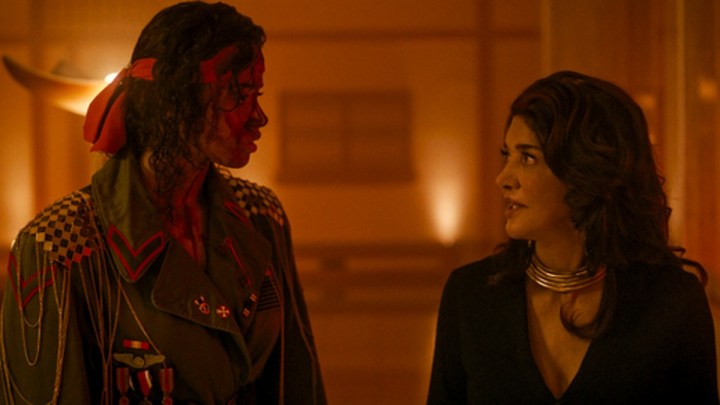
Like any final girl, you had a few hardcore montages.
Balinska: I mean… you know. [Laughs]
I liked the one when Cherie put on the soldier’s jacket. It signified that she’s a fighter. Did you have a favorite scene to shoot?
Balinska: Yes and no. It’s a love-hate thing. It’s a traumatic film. [Laughs] I was like, “I love it, but I kind of didn’t like it.” The jail cell scene with Pilou was amazing. I hated the set, but I loved working with him in that scene. The underground rave was a real location that was built with all the lights to feel like a rave. I’m a bit of a rave kid. I mean I have neon lights in my room right now. That was epic. [Laughs]
It looked like a good time.
Balinska: We really did have pounding music on set. Plus the lead-up to that scene with the bleach was really enjoyable. I could see in the mirror that I was looking in, the crew wincing.
Enjoyable is an interesting word to use for that.
Balinska: I’m using makeup wipes. It’s makeup wipes and plastic. It goes to show how amazing the world-building is in this film. That you can really think that’s real.
Run Sweetheart Run is available to stream globally on Prime Video.



